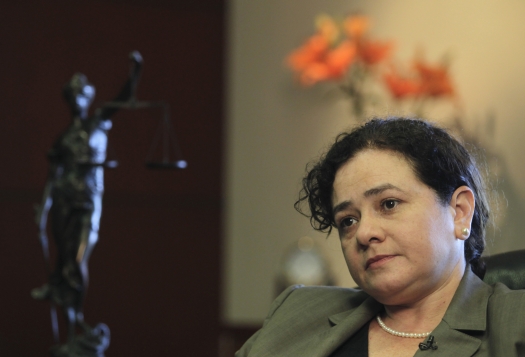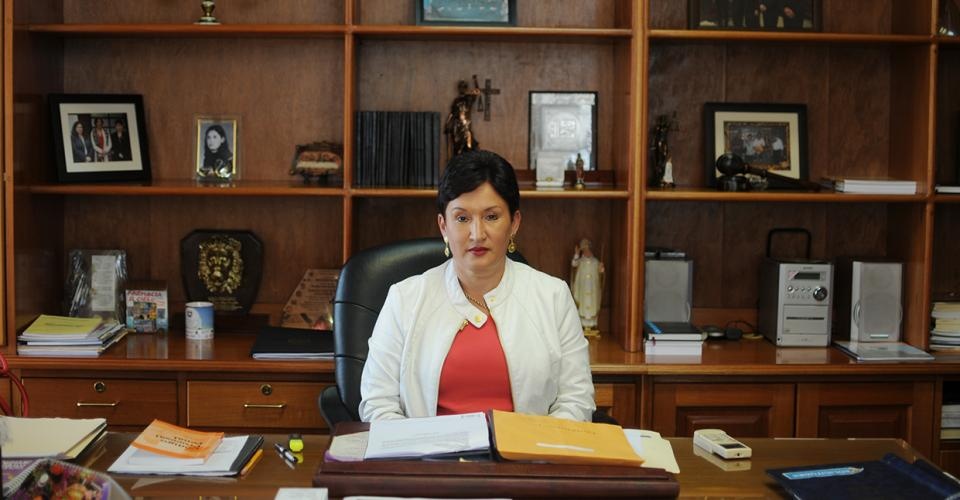Guatemala’s new attorney general, Thelma Esperanza Aldana Hernández, took office Saturday after a selection process fraught with irregularities. Aldana describes herself as “right wing”and was considered the favorite from early on due to her ties to the President Pérez Molina’s Patriot Party and evidence she was backed by one of the Party’s powerful political operatives, raising questions about her independence.
As Dr. Claudia Paz y Paz walked out of Guatemala’s Public Prosecutor’s Office on Friday, May 16th, she was greeted by hundreds of people and a carpet of pine needles and flowers lining her way. These men and women were there to accompany her on her last day as attorney general, calling her the “Prosecutor of Dignity” for her successful efforts over the last three and a half years to bring justice to victims and to enforce the rule of law.
Guatemala’s new attorney general, Thelma Esperanza Aldana Hernández, took office Saturday after a selection process fraught with irregularities. The rushed transition has generated severe criticism from national and international observers, and human rights groups have suggested that it is part of a coordinated effort to terminate the advances made under her predecessor.
As attorney general, Dr. Paz y Paz was a symbol of hope and justice for many Guatemalans frustrated with the country’s judicial institution that historically has served the interests of the economic, political, and military elite. Under her leadership, investigation of cases from the internal armed conflict, some that had lay dormant for a decade or more, began to move forward. Her bold prosecutions of those previously considered untouchable – including corrupt former officials, narco-bosses, high level military officers, and other human rights violators – made history in Guatemala, and contributed to an overall reduction in impunity of almost 25 percent for violent crime.
However, not everyone appreciated these successes, and Paz y Paz was one of the principle targets of pro-military groups that sponsored aggressive defamation campaigns against her in the press and social media. The attacks intensified during and after the genocide case in 2013, and culminated with legal maneuvering to oust her from office. In February 2014, nine months after reversing the conviction of former head of state Ríos Montt for genocide and war crimes, the Constitutional Court ruled to cut short Paz y Paz’s term by seven months. The Court called on the Congress to immediately form the nominating commission for the next Attorney General. Despite the questionable legal basis for the decision, Congress obliged, voting unanimously to implement the ruling just a few days later.
Public reaction to the decision was immediate, as national and international groups, including the US Embassy, criticized the ruling as arbitrary and politically motivated. At a public hearing on February 26, overflowing with journalists and concerned citizens, Paz y Paz herself addressed the Court: “What is at stake here […] is the legacy of the constitution, of the rule of law, of Guatemala’s democracy. The reduction of constitutional terms threatens judicial autonomy and independence.”
The Court was unmoved, however, and the nominating process moved forward at a break-neck speed. Concerns about serious irregularities arose throughout the process, including a lack of transparency around exactly how the candidates would be evaluated and an alleged threat against one of the members of the Commission. A conversation leaked to the press suggested an “orchestrated plan” to affect the selection process. The President of the Commission admitted “it was possible” there had been outside intervention in the process.
 When the Commission announced its top six candidates, Paz y Paz’s name was conspicuously absent, despite the fact that the Commission itself had given her the second highest score among the 26 candidates. Of the six finalists, most had little to no experience in the criminal justice system and several have been the subject of serious objections by the International Commission Against Impunity in Guatemala (CICIG) and other groups.
When the Commission announced its top six candidates, Paz y Paz’s name was conspicuously absent, despite the fact that the Commission itself had given her the second highest score among the 26 candidates. Of the six finalists, most had little to no experience in the criminal justice system and several have been the subject of serious objections by the International Commission Against Impunity in Guatemala (CICIG) and other groups.
The Human Rights Convergence – a coalition of Guatemalan human rights groups – denounced the process as a “perverse game” to consolidate a “pact of impunity” to protect powerful sectors, including structures responsible for serious human rights violations, the economic elite, the traditional oligarchy, and organized criminal groups. The coalition’s petition with over 6,000 signatures from Guatemalan citizens requesting that the Commission justify why it left Paz y Paz off the list was rejected. Numerous international groups again expressed concern.
The process seemed unstoppable, however, and on May 9, President Otto Pérez Molina announced Thelma Aldana as the next attorney general.
Aldana describes herself as “right-wing” but says she keeps her political views separate from her job. She has held various positions in the Judicial Branch for more than 20 years, including her recent tenure as President of the Supreme Court, yet she has no experience as a prosecutor. Nonetheless, Aldana was considered the favorite from early on due to her ties to the President’s Patriot Party and evidence she was backed by one of the Party’s powerful political operatives, raising questions about her independence. (Pérez Molina denied this, saying instead that she was selected for her many years of experience.) Allegations of her political ties aren’t new. In 2009, concerns about connections with powerful members of the FRG, the political party founded by Ríos Montt, were serious enough for the CICIG to object to her candidacy for the Supreme Court.
Aldana’s critique of Paz y Paz suggest that she will prioritize prosecuting common, “everyday” crimes – she mentions cell phone robberies and property rights issues as examples – “so the population feels supported.” Her previous work in the courts on violence against women provides some hope that she will also channel resources into prosecuting those cases.
 It seems unlikely, however, that Aldana will continue Paz y Paz’s legacy of confronting impunity for crimes of the past, particularly given her ties to both the FRG and the Patriot Party, two groups that have denounced prosecutions of members of the military. Asked by Plaza Pública about cases from the internal conflict, Aldana said she would “have to analyze” the question of amnesty, a clear departure from the position of her predecessor. This shift may indeed serve to cement a “pact of impunity” given that little political will exists elsewhere in the government to address historic impunity. Last week, the Congress passed a resolution denying genocide occurred and criticizing the genocide case for hurting national reconciliation. The resolution seeks a de-facto amnesty, much like the murky Constitutional Court ruling last year that overturned the genocide verdict.
It seems unlikely, however, that Aldana will continue Paz y Paz’s legacy of confronting impunity for crimes of the past, particularly given her ties to both the FRG and the Patriot Party, two groups that have denounced prosecutions of members of the military. Asked by Plaza Pública about cases from the internal conflict, Aldana said she would “have to analyze” the question of amnesty, a clear departure from the position of her predecessor. This shift may indeed serve to cement a “pact of impunity” given that little political will exists elsewhere in the government to address historic impunity. Last week, the Congress passed a resolution denying genocide occurred and criticizing the genocide case for hurting national reconciliation. The resolution seeks a de-facto amnesty, much like the murky Constitutional Court ruling last year that overturned the genocide verdict.
While debate has centered on cases from the past, there is much more at stake than Guatemala’s transitional justice process. The situation of human rights defenders in Guatemala is deteriorating. In 2013, the Human Rights Defenders Protection Unit documented 18 targeted assassinations and received hundreds of complaints of intimidation, threats, and other attacks.
Communities who oppose extractive industry projects and defend their land and environment have also been frequent victims of government repression. This repression is increasingly unleashed through politically motivated prosecutions. Several dozen community leaders currently face trumped-up criminal charges such as kidnapping and terrorism. How the new attorney general addresses this issue will have a huge impact on social movements in the country, as well as citizen’s ability to safely defend their rights.
Aldana, the new attorney general, also has worrying ties to the energy sector. A public declaration of assets showed that in 2008 Aldana—then a Supreme Court judge—owned shares in one of the nation’s largest electric power distributors, DEORSA. The company has been the target of numerous complaints of poor service and high costs. The issue has generated a series of community-based protests demanding the nationalization of electric energy, and is linked to broader conflicts over the construction of future hydroelectric dams.
For human rights organizations and international groups monitoring the rule of law in Guatemala, all the evidence points to a backward slide towards rampant impunity. One can only hope Aldana will prove her critics wrong.
Kelsey Alford-Jones is the Director of the Guatemala Human Rights Commission/USA, a non-profit, grassroots, solidarity organization dedicated to promoting human rights in Guatemala and supporting communities and activists who face threats and violence. GHRC documents and denounces abuses, educates the international community, and advocates for policies that foster peace and justice.
